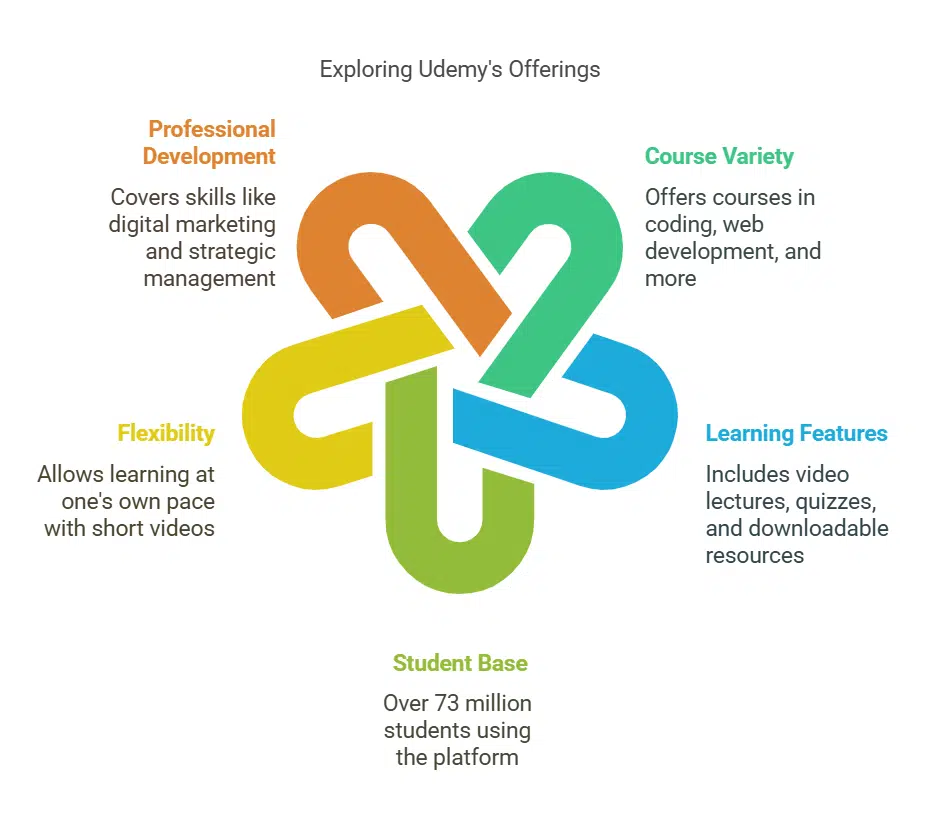Starting a tech business can feel overwhelming. Having the right skills and knowledge is key to success. Online Learning Platforms For Aspiring Tech Entrepreneurs make it easier—offering courses on startups, innovation, and funding strategies.
Keep reading to find tools that can transform your ideas into reality!
Best Online Learning Platforms For Aspiring Tech Entrepreneurs
| Platform | Key Courses/Programs | Duration & Cost | Key Features |
|---|---|---|---|
| Coursera | Tech Entrepreneurship by Univ. of Colorado | 4 months (Free, Financial Aid) | Business planning, real-world projects |
| Udemy | Coding, Web Dev, SEO, Business Models | Flexible (Free & Paid) | 250,000+ courses, quizzes, certificates |
| Harvard Business School Online | Entrepreneurship Essentials, Launching Tech Ventures | 4-5 weeks ($1,850+) | Case studies, VC insights |
| Udacity | AI, Data Science, Software Engineering | Flexible (Paid) | Bootcamp-level, hands-on projects |
| MIT OpenCourseWare | New Enterprises, Business Plans | Self-paced (Free) | 30,000+ startups by alumni |
| Y Combinator Startup School | Free Startup Accelerator Training | 7 weeks (Free) | Co-founder matching, startup guidance |
| Skillshare | Coding, Marketing, MVP Development | Monthly Subscription | Community interaction, project-based |
| Google Digital Garage | AI, Cloud Computing, Marketing | Self-paced (Free) | Google certifications available |
| MasterClass | Tech & Innovation by Industry Leaders | Subscription-based | Learn from top CEOs & innovators |
| Columbia Business School Online | Digital Strategies, Venture Capital | 1-4+ weeks ($5,000-$10,000) | Live online & blended options |
| Wharton Online | Leadership, Financial Planning, Digital Marketing | Varies ($2,340-$5,000) | IACET accredited, professional certs |
| Stanford Online | Business Growth, Startup Funding | Self-paced (Free & Paid) | Focus on investment & scaling |
| Maven | Flexible Entrepreneur Courses | Varies (Paid) | Ranked courses, personalized guidance |
| Kauffman FastTrac® | Business Planning & Launch Strategy | 8-12 weeks (Free & Paid) | Market research, MVP development |
| LinkedIn Learning | Business Models, Marketing, MVPs | $39.99/month or $239.88/year | Certificates, career-based suggestions |
| Khan Academy | Business Models, Market Research | Self-paced (Free) | Simple, structured lessons |
| IDEO U | Design Thinking, Innovation Strategies | $199-$3,395 | Hands-on, leadership-focused |
| HubSpot Academy | Marketing, SEO, Content Strategy | Self-paced (Free) | Industry-recognized certifications |
| FutureLearn | Market Research, Business Models | Self-paced (Free & Paid) | Online degrees, micro-credentials |
| EdX | AI, Cybersecurity, Tech Entrepreneurship | Varies (Free & Paid) | Harvard & MIT courses, enterprise plans |
1. Coursera for Tech Entrepreneurship
Coursera offers a program for tech entrepreneurs created by the University of Colorado Boulder. It focuses on building a full business plan for a new technology startup. The program includes three courses and has an excellent 4.5-star rating from 16 reviews.
This free online course takes about four months to finish if you dedicate around seven hours each week. Financial aid is available, making it accessible for many learners. Freelancers can gain an entrepreneurial mindset while designing real-world projects like MVPs (minimum viable products).
2. Master Tech Skills on Udemy
Udemy offers over 250,000 online courses. Tech entrepreneurs and freelancers can find classes on coding, web development, machine learning, and more. The platform has both free and paid options for budget flexibility.
Many courses include video lectures, quizzes, and resources to download.
Over 73 million students use Udemy to learn trending tech skills. Popular programs teach topics like digital marketing or social media strategies for content creation. Take a class on search engine optimization (SEO) to boost your website’s traffic.
Learn business models or startup funding tips from real-world examples shared by experts.
Freelancers benefit from Udemy’s flexibility in pacing lessons. Short videos allow learning during breaks or busy days. Courses cover strategic management for improving operations in startups too! Whether you’re into mobile marketing or innovation in technology entrepreneurship—there’s something here for every professional goal.
3. Harvard Business School’s Online Tech Ventures
Harvard Business School Online offers two strong programs for tech entrepreneurs. “Entrepreneurship Essentials” runs for 4 weeks, asking for 6-8 hours per week. It costs $1,850. Learners focus on spotting opportunities, testing ideas, and making smart money choices.
Jeffrey Bussgang leads the course with insights from venture capital work.
The “Launching Tech Ventures” program lasts 5 weeks. It helps students shape business models and master startup strategies. Freelancers can use these lessons to plan MVPs or secure funding from venture capitalists.
Both courses provide real-world examples and case studies to fuel innovation in tech entrepreneurship.
4. Accelerate with Udacity’s Tech Courses
Udacity offers bootcamp-level tech education at a fraction of the cost. Freelancers can pick courses like “Intro to Machine Learning” or “SQL for Data Analysis” to sharpen their skills.
Their software engineering programs cover popular languages like Python, Swift, and Java.
AI enthusiasts will love classes on “Deep Learning” and “Natural Language Processing.” Each course includes hands-on projects with personal feedback from experts. This real-world learning helps you create a solid portfolio while mastering technology entrepreneurship tools.
5. MIT OpenCourseWare for Tech Innovators
MIT OpenCourseWare offers free, top-notch courses for tech entrepreneurs. Over 30,000 active companies started by MIT alumni prove its value. These businesses generate about $1.9 trillion in yearly revenue.
Freelancers can access resources to learn skills needed to plan and grow startups.
Courses like “15.390 New Enterprises” teach building a strong business idea. “15.S21 Nuts and Bolts of Business Plans” helps create clear business models and plans fast. For advanced learning, try graduate-level options like “IDS.910 Leadership Development.” It’s perfect for sharpening entrepreneurial leadership skills or exploring corporate entrepreneurship through the “15.369 Seminar.”.
These materials provide real-world examples that freelancers need most—practical steps, not just theory! You’ll gain insights into creating MVPs, marketing strategies, or even startup funding tips while finding inspiration from successful innovators rooted in technology entrepreneurship tools shared by MIT experts themselves!
6. Startup School by Y Combinator
Startup School by Y Combinator offers a free course for aspiring entrepreneurs. It lasts about seven weeks, with just 1-2 hours of work each week. You can learn from top experts like Mark Zuckerberg and Anne Wojcicki.
The program teaches how to build a startup, create an MVP, and improve your business model.
The co-founder matching tool has helped over 100,000 connections so far. Progress is easy to track using their weekly update feature. This allows you to focus on goals while refining strategies for success in tech entrepreneurship.
7. Skillshare for Technology Creators
Skillshare helps technology creators share and learn tech skills. It offers courses on coding, web design, social media marketing, and content strategy. Freelancers can explore video lessons, work on projects, and connect with other learners through its community features.
Instructors earn money using a royalty system. They can teach topics like building MVPs or explaining business strategies for startups. The platform supports diverse subjects such as innovations or intellectual property laws, helping users grow professionally while fostering creativity.
8. Google Digital Garage for Online Tech Mastery
Google Digital Garage offers free training to sharpen your digital skills. It covers trending topics like AI basics, cloud computing, programming, and online marketing. Freelancers can explore courses on Google AI Fundamentals for beginners or learn programming essentials.
These short lessons prepare you for even complex skills without overwhelming you.
Professional Certificates are available in areas like IT support and data analysis. For example, their IT Support Certificate focuses on practical tools and problem-solving—ideal for handling tech issues as a freelancer.
Google Activate provides beginner-friendly options like content strategy or search engine marketing. This is helpful if you’re building brands or creating a business plan from scratch.
9. MasterClass in Technology and Innovation
MasterClass offers over 100 courses taught by big names. Learn from experts like Bill Gates, Serena Williams, and Chris Voss. The technology and innovation lessons focus on building creativity for tech entrepreneurs.
A monthly fee unlocks all content. Students can explore real-world examples shared by successful leaders. These stories inspire freelancers to create strong business models or refine a minimum viable product (MVP).
For anyone aiming to excel in technology entrepreneurship, this platform provides professional development at its best.
10. Columbia Business School Online for Tech Leaders
Columbia Business School Online offers programs for tech leaders aiming to grow fast. Courses like “Digital Strategies for Business” and “Foundations of Venture Capital” stand out.
These courses help with strategic management, startup funding, and building solid business models. Prices vary from under $5,000 to over $10,000—making them an investment in professional development.
Course lengths range from 1-3 days to more than four weeks. Formats include live online sessions or blended options for flexibility. Programs start as early as February 2025, giving freelancers time to plan ahead.
Tech entrepreneurs looking into venture capital firms or market research will find real-world examples that boost decision-making skills.
11. Wharton Online Tech Programs
Wharton Online offers over 60 courses for professional development. Freelancers can sharpen their skills in leadership, technology entrepreneurship, and strategic management. These programs are accredited by IACET, ensuring high-quality education.
Freelancers interested in business ideas or startup funding might find the Leadership and Management Certificate helpful. It costs $3,600 and focuses on essential tools for managing teams.
The Digital Marketing Certificate at $2,340 explores social media marketing and content strategy—key skills for any aspiring entrepreneur.
For those aiming to understand finances better, Wharton provides the Financial Planning & Analysis Certificate at $5,000. This program teaches ways to enhance profitability through smart budgeting techniques.
With these options, tech entrepreneurs can gain real-world knowledge while building a strong foundation for their startups.
12. Stanford Online for Aspiring Tech Professionals
Stanford Online offers top courses for aspiring tech experts. Freelancers can learn with free options like “The Elements of Entrepreneurial Success” and “Business Growth: Start-ups, Investment, and Negotiation.” These classes teach key skills such as business planning, startup funding, and negotiation techniques.
These programs are ideal for building an entrepreneurial mindset. They focus on real-world examples to help in professional development. You’ll gain confidence while preparing your MVP or mastering data-driven strategies for success in today’s market economy.
13. Maven: A Hub for Tech Entrepreneurs
Maven connects tech entrepreneurs with top online entrepreneurship courses. It ranks these programs based on flexibility, instructor skill, prerequisites, and completion time. This platform focuses on fostering an entrepreneurial mindset for personal growth.
Maven provides tips to simplify online learning. Learners receive guidance on cost evaluation and ensuring their technology functions effectively. The platform supports adaptable schedules, allowing freelancers to balance work and study smoothly.
Courses highlighted are customized for the tech industry and focus on practical examples essential for success in startup companies or social entrepreneurship ventures.
14. Kauffman FastTrac® for Tech Startups
Kauffman FastTrac® offers a structured path for aspiring entrepreneurs. It breaks the journey into five clear modules: Ideate, Position, Commit, Refine, and Launch. These steps help you shape a business idea into a viable business model.
The courses are self-paced but also include facilitator-led sessions for added guidance.
The program runs for 8-12 weeks and supports both English and Spanish speakers. You learn to conduct market research, develop an MVP (minimum viable product), and create a solid business plan.
With real-world examples included in the coursework, it’s practical and hands-on. This helps early-stage tech startups prepare for challenges like startup funding or strategic management.
Freelancers can use this course to refine content strategy or explore social entrepreneurship opportunities. Building skills such as entrepreneurial operations or target market analysis becomes easier with its approach.
Whether testing an idea or committing to launch, these tools help turn creativity into profitability!
15. LinkedIn Learning in Technology
LinkedIn Learning offers over 16,000 courses. Many focus on technology entrepreneurship and practical skills. For $39.99 a month or $239.88 a year, freelancers can unlock lessons about business models, MVPs, content marketing strategies, and more.
Certificates of completion boost resumes and LinkedIn profiles instantly. The platform suggests courses based on career goals or past jobs. Aspiring entrepreneurs can learn social media marketing or strategic management while also exploring startup funding tips.
16. Khan Academy’s Resources for Tech Entrepreneurs
Khan Academy offers free tools to aspiring entrepreneurs. It provides lessons on market research, business models, and startup funding. These resources break down complex topics into easy steps.
Freelancers can explore videos on MVP (minimum viable product) creation or study real-world examples.
The platform also highlights entrepreneurship essentials like strategic management and profitability tips. Anyone eager to master tech entrepreneurship can benefit from its clear guides.
With no cost involved, it’s an effective way for beginners to learn professional development skills.
17. IDEO U for Design Thinking in Tech
IDEO U offers courses focused on design thinking and innovation. Freelancers can improve their problem-solving skills while learning new strategies to grow. Courses like “Insights for Innovation” or “Human-Centered Service Design” teach real-world examples of creating user-focused solutions.
Prices range from $199 to $3,395, making it flexible for different budgets.
The platform has over 80,000 alumni across 157 countries. Their programs help users build leadership skills while staying creative within technology. For freelancers developing a business model or MVP (minimum viable product), these lessons are useful tools for success in tech entrepreneurship.
Their certificate programs focus on hands-on learning and professional development. With such training, aspiring entrepreneurs can sharpen essential skills quickly.
18. HubSpot Academy for Tech Marketers
HubSpot Academy offers free courses for tech marketers looking to grow. It covers inbound marketing, social media strategies, email marketing, and content strategy. Over 200,000 professionals earned certifications here.
These are industry-recognized and boost credibility.
Freelancers gain practical skills to market a business or startup effectively. The HubSpot Content Marketing Certification helps with creating plans that attract leads. All resources on this platform cost nothing but time—perfect for building professional development without breaking the bank.
19. FutureLearn for Tech Entrepreneurs
FutureLearn offers 244 courses for tech entrepreneurs. These cover market research, business models, and strategic management. You can explore free classes or upgrade to unlock more features.
Freelancers looking to grow their skills will appreciate its flexibility.
It also provides 14 Microcredentials and 15 ExpertTracks for deeper learning. The online degree program “Technological Futures” helps with long-term professional development. Learn concepts such as MVP (minimum viable product) or social entrepreneurship through clear examples and structured lessons.
20. EdX Courses for Tech Industry Aspirants
EdX offers courses for tech-focused freelancers. Choose programs in AI, Cybersecurity, or Data Science. Learn the basics or advanced skills with their certificates and Master’s Degrees.
Over 3,000 courses are available through massive open online courses (MOOCs). These cover topics like content strategy or technology entrepreneurship.
Freelancers can access EdX Enterprise subscriptions for unlimited learning options. This is helpful if you plan to master multiple areas like social media marketing or strategic management.
Gain real-world examples from schools such as Harvard University and MIT. Practical lessons on creating a business model or MVP (minimum viable product) prepare you for the tech industry challenges ahead.
Takeaways
Learning tech entrepreneurship online is easier than ever. These 15 platforms offer tools to build skills, grow ideas, and start businesses. From courses on startups to marketing strategies—there’s something for everyone.
Pick a platform that fits your goals and start today! The right course can turn your idea into success.
FAQs on Online Learning Platforms For Aspiring Tech Entrepreneurs
1. What are the best online learning platforms for aspiring entrepreneurs?
Platforms like Harvard Business School Online, Y Combinator’s Startup School, and Founder University offer courses on entrepreneurship essentials, startup funding, and building a business model.
2. Can I learn how to create a business plan through these platforms?
Yes! Many programs include lessons on creating a business plan, developing an MVP (minimum viable product), and strategic management to help you shape your ideas into real-world solutions.
3. Do these courses teach social media marketing or content strategy?
Absolutely. Courses like HubSpot Content Marketing Certification cover topics such as content strategy and social media marketing to grow your brand effectively.
4. Are there interactive tools or mentorship opportunities available?
Yes, some platforms provide case studies, real-world examples, and even mentorship options—like those offered by Y Combinator—to guide you step-by-step in your entrepreneurial journey.
5. Can I find specialized courses for technology entrepreneurship?
Definitely! Programs like “How to Build a Startup” focus specifically on technology entrepreneurship while offering insights into financing and profitability strategies.
6. Will these courses improve my professional development as an entrepreneur?
Yes! With offerings ranging from market research techniques to entrepreneurial operations training at institutions such as Harvard University, they equip you with practical skills for long-term success in any industry.







































